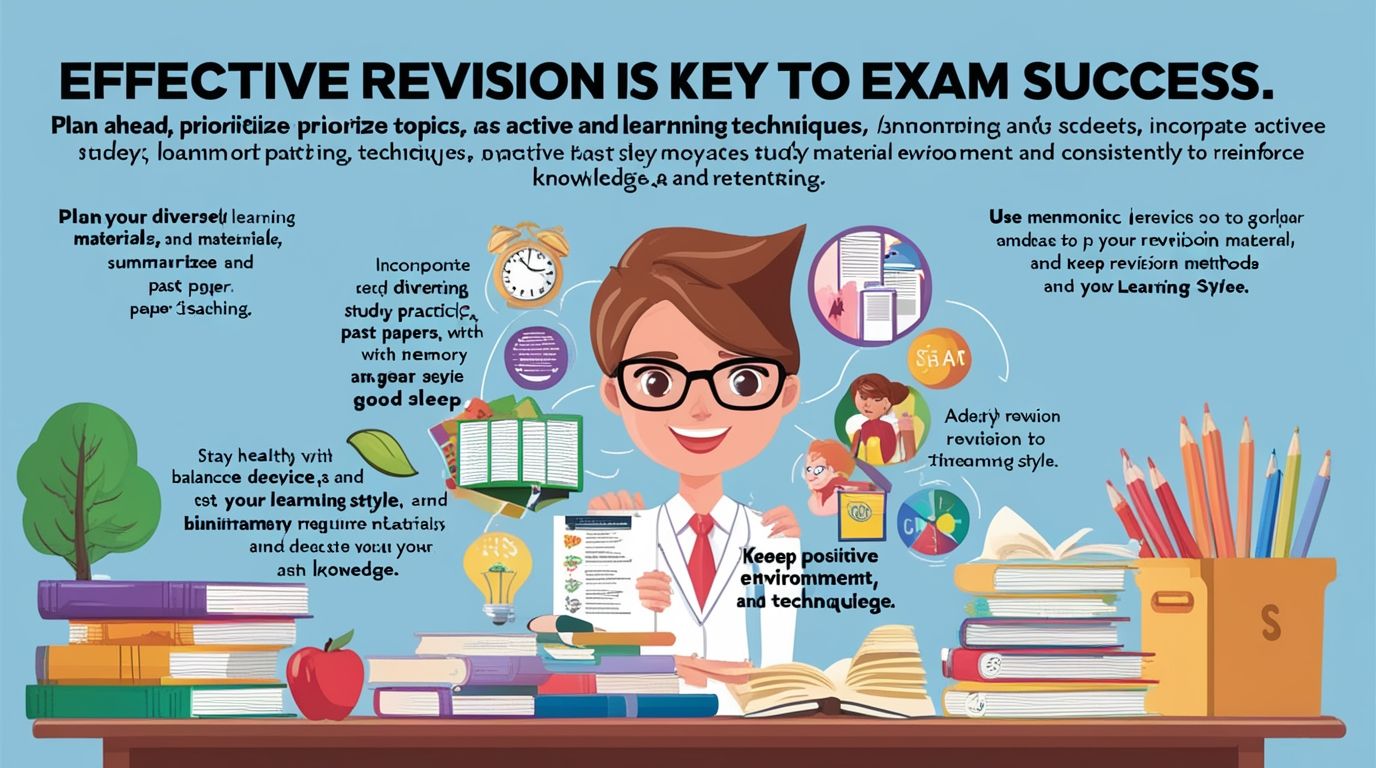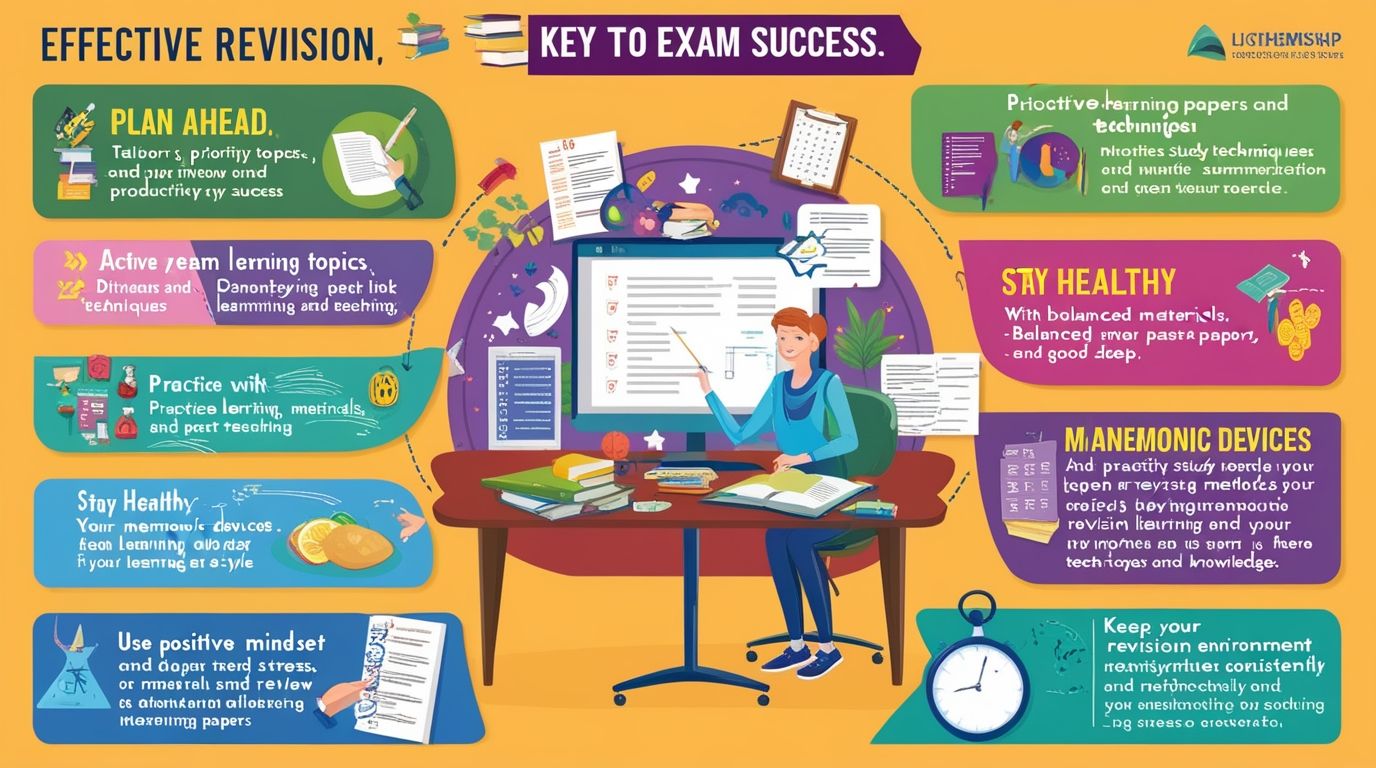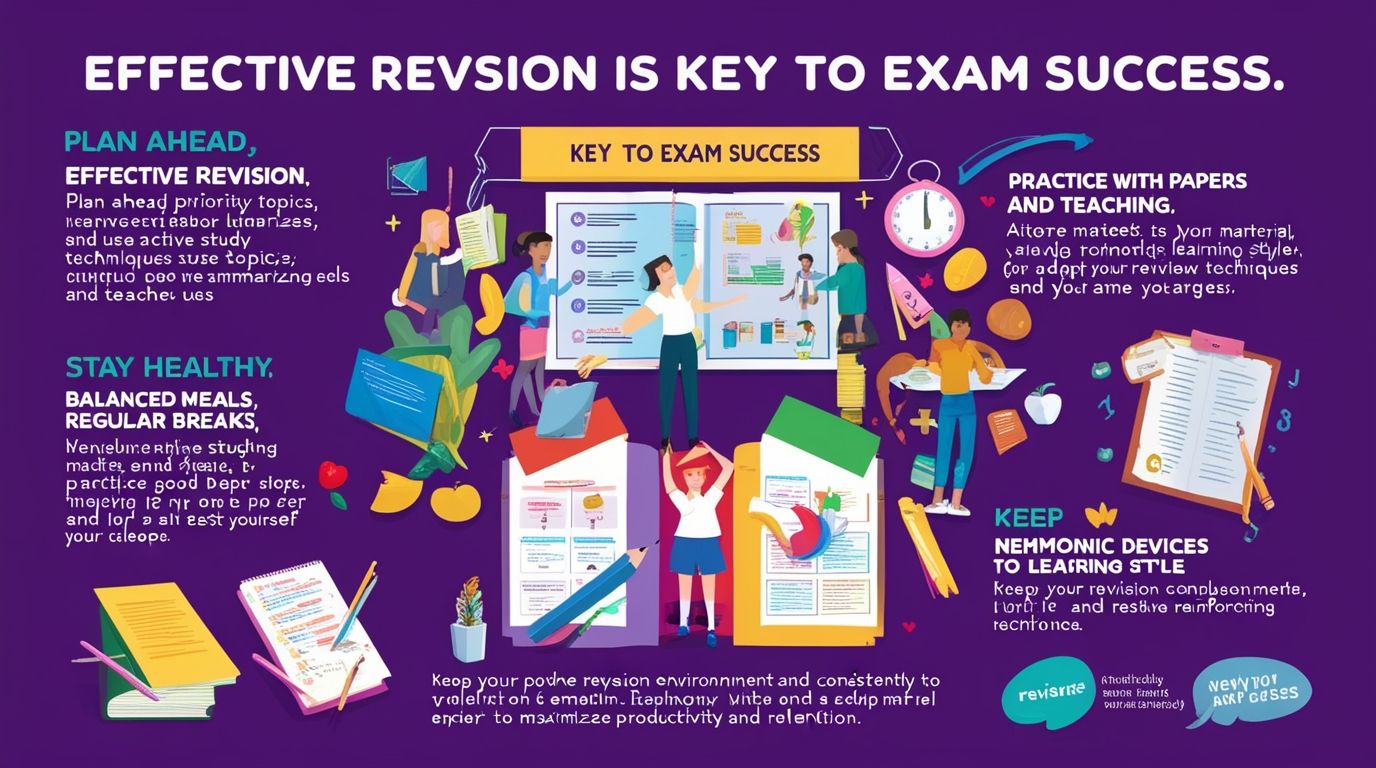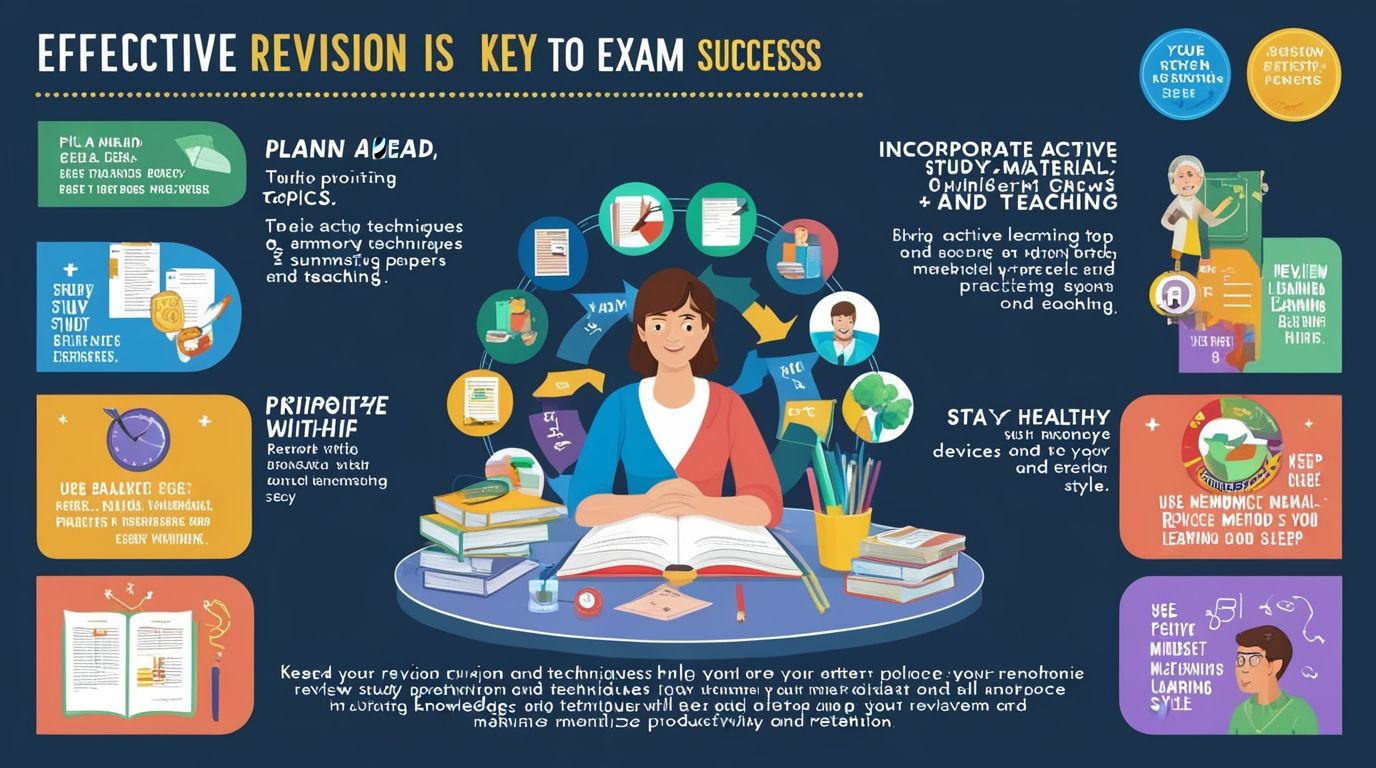Useful Tips for Effective Revision Lessons Revision is a crucial part of the learning process, particularly when preparing for exams or assessments. Effective revision lessons help reinforce understanding, clarify doubts, and boost confidence. Below are some practical tips that can be utilized to ensure that revision sessions are productive and efficient.
1. Plan Ahead
Effective revision starts with a solid plan. Begin by identifying the topics that need revising and prioritize them based on their difficulty level and importance. Allocate specific time slots for each topic and stick to this schedule as closely as possible. Planning helps in avoiding last-minute cramming and ensures comprehensive coverage of all necessary material.
Key Points:
- Break down the syllabus into manageable chunks.
- Set clear, achievable goals for each session.
- Incorporate regular breaks to avoid burnout.
2. Understand the Learning Objectives
Before diving into revision, it’s essential to understand what is expected from you. Review the learning objectives or exam syllabus to ensure you’re focusing on the right areas. Understanding the objectives will help in tailoring your revision to meet specific requirements.
Key Points:
- Refer to the syllabus or exam guide.
- Focus on key concepts and areas with higher marks weightage.
- Clarify any uncertainties with teachers or peers.
3. Active Learning Techniques
Passive reading or rote memorization is less effective than active learning techniques. Engage with the material by summarizing notes, teaching the content to someone else, or using flashcards. These methods encourage deeper understanding and better retention of information.
Key Points:
- Use mind maps to connect ideas.
- Practice self-explanation by teaching the content.
- Create and use flashcards for quick reviews.

4. Incorporate Different Study Materials
Relying solely on textbooks can be monotonous. Diversify your study materials by incorporating videos, podcasts, online quizzes, and past exam papers. Different formats can help in grasping difficult concepts and keeping the revision sessions interesting.
Key Points:
- Watch educational videos for visual and auditory learning.
- Listen to subject-related podcasts during commutes.
- Use past papers to familiarize yourself with exam formats.
5. Practice with Past Papers
Practicing past exam papers is one of the most effective ways to prepare for exams. It helps you get familiar with the question format, understand the marking scheme, and time yourself effectively. This also helps in identifying areas where you may need further revision.
Key Points:
- Set aside time for full-length practice exams.
- Review and understand the marking schemes.
- Analyze mistakes and focus on areas of improvement.
6. Group Study Sessions
While individual study is important, group study sessions can offer several benefits. Discussing topics with peers can provide new insights, clarify doubts, and reinforce learning. However, it’s important to stay focused and avoid turning group sessions into social gatherings.
Key Points:
- Organize regular study groups with focused agendas.
- Share and discuss difficult concepts.
- Use the group to test each other on key topics.
7. Use Mnemonics and Memory Aids
Mnemonics and other memory aids can be incredibly helpful for remembering lists, formulas, or complex concepts. Creating acronyms, rhymes, or visual images associated with the content can make recall easier during exams.
Key Points:
- Develop mnemonics for difficult-to-remember content.
- Use visualization techniques to link concepts.
- Create rhymes or songs for sequences or lists.

8. Stay Healthy
Your physical and mental well-being plays a crucial role in effective revision. Ensure you’re eating nutritious meals, staying hydrated, and getting enough sleep. Regular physical activity can also boost cognitive function and reduce stress.
Key Points:
- Maintain a balanced diet rich in brain-boosting foods.
- Stay hydrated with water and avoid excessive caffeine.
- Incorporate regular physical exercise into your routine.
9. Regular Breaks
The human brain can only focus effectively for a limited time. Taking regular breaks during revision sessions is essential to avoid burnout and maintain productivity. The Pomodoro Technique, where you work for 25 minutes and then take a 5-minute break, is one method that can help in sustaining focus.
Key Points:
- Use time management techniques like Pomodoro.
- Take short breaks every hour to refresh your mind.
- Engage in relaxing activities during breaks.
10. Test Yourself Regularly
Self-assessment is crucial in understanding what you have retained and what needs further revision. Regular testing, either through quizzes or practice exams, can help you gauge your progress and adjust your revision plan accordingly.
Key Points:
- Use online quizzes or create your own.
- Regularly test yourself on key concepts.
- Analyze results to identify weak areas.
11. Seek Feedback
Don’t hesitate to seek feedback from teachers, tutors, or peers on your progress. They can provide valuable insights and highlight areas that may require more attention. Constructive criticism can be a powerful tool in refining your revision strategies.
Key Points:
- Ask teachers for feedback on practice papers.
- Discuss your revision strategy with a mentor.
- Use feedback to improve and adjust your study plan.
12. Focus on Understanding, Not Just Memorization
While memorization has its place, understanding the material deeply will make it easier to recall during exams. Focus on understanding the underlying concepts and how they connect rather than just rote learning.
Key Points:
- Use the Feynman Technique to explain concepts in simple terms.
- Relate new information to what you already know.
- Focus on the ‘why’ behind each concept.
13. Stay Positive and Motivated
Maintaining a positive attitude towards revision is key to staying motivated. Set small, achievable goals and reward yourself for meeting them. Surround yourself with supportive people and keep reminding yourself of the end goal.
Key Points:
- Set small milestones and celebrate achievements.
- Use motivational quotes or affirmations.
- Stay connected with supportive friends or family.
14. Review Regularly
Regular review of material is necessary to reinforce learning and move information from short-term to long-term memory. Schedule regular review sessions for topics you’ve already revised to ensure that the information stays fresh.
Key Points:
- Use spaced repetition techniques.
- Schedule weekly review sessions.
- Revisit difficult concepts multiple times.
15. Create a Conducive Study Environment
The environment in which you study plays a significant role in how effective your revision is. Ensure your study space is free from distractions, well-lit, and comfortable. Having all necessary materials at hand can also save time and keep you focused.
Key Points:
- Keep your study space organized and clutter-free.
- Minimize distractions by turning off notifications.
- Ensure good lighting and ergonomic seating.
16. Adapt Your Learning Style
Different students have different learning styles, and it’s important to adapt your revision methods to what works best for you. Whether you’re a visual learner who benefits from diagrams and charts, or an auditory learner who prefers listening to explanations, tailor your revision sessions to your strengths.
Key Points:
- Identify your learning style (visual, auditory, kinesthetic).
- Use tools and techniques that align with your style.
- Experiment with different methods to find what works best.
17. Time Management During Exams
Practicing time management during revision helps in better handling the time during actual exams. Time yourself while practicing past papers to get a realistic idea of how much time you should spend on each question.
Key Points:
- Allocate time to each question based on marks.
- Practice answering under timed conditions.
- Learn to move on if you’re stuck on a question.
18. Use Technology Wisely
There are numerous apps and tools designed to aid in revision. From flashcard apps to online study groups, technology can provide a range of resources to enhance your revision. However, it’s important to use these tools wisely to avoid distractions.
Key Points:
- Use apps for flashcards, note-taking, and time management.
- Join online forums or study groups for peer support.
- Avoid social media and other distractions during study time.

19. Keep a Revision Journal
A revision journal can help you keep track of what you’ve studied, how you’re progressing, and what needs more attention. Writing down reflections on each session can also help in identifying effective strategies and areas needing improvement.
Key Points:
- Record what you cover in each session.
- Reflect on what went well and what didn’t.
- Use the journal to adjust your revision plan as needed.
20. Stay Calm and Manage Stress
Finally, staying calm and managing stress is essential for effective revision. High stress levels can hinder your ability to concentrate and retain information. Practice mindfulness, deep breathing, or other relaxation techniques to stay composed.
Key Points:
- Practice mindfulness or meditation.
- Use deep breathing techniques to relax.
- Take regular breaks to manage stress.
Conclusion
Revision lessons are vital in consolidating knowledge and preparing for exams. By planning effectively, using active learning techniques, and maintaining a balanced lifestyle, students can make the most of their revision sessions. Remember that consistency is key, and staying motivated, focused, and positive will lead to successful outcomes.

3 thoughts on “Useful Tips for Effective Revision Lessons”
Comments are closed.